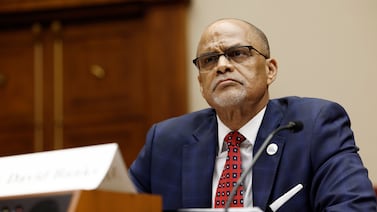Meal options will be limited for students in the Detroit school district for the next week or two because an employee strike against the district’s main food distributor is causing disruptions in service.
Nikolai Vitti, superintendent of the Detroit Public Schools Community District, told district families about the disruption on Wednesday.
“All students in all schools at all grade levels will continue to be fed breakfast and lunch,” Vitti said Thursday morning during a policy conference in Detroit.
“The menu will be lighter, but we’ll continue to feed everyone,” Vitti said.
The disruption to school meals is particularly important in a district like Detroit, where a significant proportion of students come from low-income homes and rely on the breakfasts and lunches they receive at school.
US Foods is a national company that distributes food to schools, restaurants, health care facilities, and hospitality businesses such as hotels. The company has a distribution center in Wixom.
Officials from the company could not be reached for comment.
Angela Angeles’ four children, who attend Maybury Elementary and Priest Elementary in southwest Detroit, began complaining earlier in the week that their portion sizes for lunch have gotten smaller.
The district notified parents about the US Foods strike Thursday morning via text message, she said.
As a former parent outreach coordinator for DPSCD, Angeles said she had seen school cafeterias run short of certain items.
“Sometimes it’d be like, pizza and french fries (for lunch) and then some kids would just get pizza and no french fries, because they will run out of french fries, so we offer them something else,” Angeles said. “Once they run out of french fries or chicken nuggets, they substitute it with corn or stuff like that for different grades.”
Until US Foods is able to resume normal deliveries, Angeles said she will make sure her children eat breakfast before going to school and have them bring a packed lunch.
Vitti said the strike by the company’s truck drivers is “preventing the district from receiving the volume of food regularly received to feed students.” He said the district was exploring other food vendors in order to provide basic food options to students.
Vitti said the closest strike affecting Detroit schools was in Wixom and was resolved Wednesday.
“There are still some lingering supply chain issues, but we will continue to feed all children breakfast and lunch.”
Detroit isn’t the only school district affected. In Indiana, WTHR reported that some districts were experiencing delays in food deliveries.
BridgeDetroit reporter Micah Walker contributed to this report.
Lori Higgins is the bureau chief for Chalkbeat Detroit. You can reach Lori at lhiggins@chalkbeat.org.
Orlando Bailey is the engagement director for BridgeDetroit. You can reach him at obailey@bridgedetroit.com







